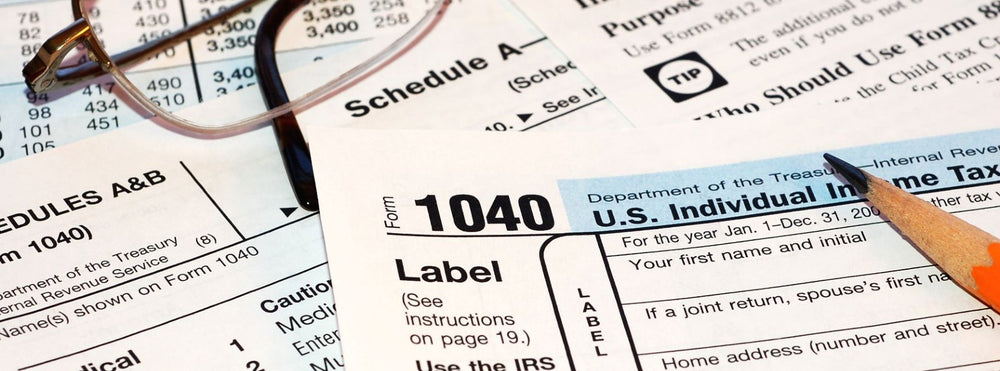Forget Tax Returns, Let’s Give Out Health Returns

It's tax season and next week we all come up against the Federal Income Tax return deadline. Every April we are starkly reminded of just how much we pay, wondering how long it will take for us to see our return, and worried that this years’ return won’t be as big as last year’s. This is also a time we might be stopping and asking ourselves “where is all this money going anyway?”.
Turns out a huge chunk of it, about 25% of the Federal budget or 1.1 TRILLION dollars, goes to healthcare.
I’m a doctor, not a lawmaker. So I will hold my tongue (mostly) about how our representatives should solve our very complicated tax and policy problems. But as someone who takes care of real people suffering with real health issues, many of which are preventable, I most definitely have ideas about what to do with the largest single piece of our federal budget.
Here’s my pitch: Let’s give health returns just like we give tax returns! Not convinced? Let me make the case.
I suspect we can all agree on the following:
- We want our healthcare tax dollars to be spent as effectively as possible.
- We want to see Americans getting healthier as a result of our healthcare spending.
- We want to see our healthcare dollars work to address the root causes of disease, rather than treating disease symptoms.
- We want to promote healthy habits, rather than enable disease-promoting cycles.
If you agree with all of that, you may be sad to learn (or you may be sad because you already know) that this is not what’s happening. In fact, in America we are getting the exact opposite of what we want.
Are we spending our healthcare tax dollars effectively?
No. We have the most well-funded healthcare system in the world, spending more than any other country, and nearly TWICE the average of other wealthy nations. And yet we are not one the healthiest countries in the world. We’re not even in the top 25! We’re #35 according to Bloomberg’s Global Health Index.
Are we getting healthier as a result of all this spending?
Also no. In fact, we slipped backward by 1 spot in that global health index the year prior. And while there are a few exciting developments in medical interventions, we’re not only NOT making progress on our burden of chronic disease, we’re actually going BACKWARDS. For example, the rate of obesity increased from 30.4% in 1999 to over 42.4% in 2018. Meanwhile, the prevalence of diabetes has increased by some 50% in the last 20 years with 37 million Americans now suffering with the condition and 96 million having pre-disease. And just in the last 5 years, the percent of men affected by hypertension has gone from 45.1% to 51%.
Are we spending this money to address the root cause of disease?
Tragically, the answer here is also a resounding “no” - even though there is strong consensus that it’s what we’re eating that’s making us sick. For example, look at these two quotes from CBS’ report on the global health index. First, why some countries are so healthy:
“Experts say the eating habits of the Mediterranean diet may provide clues for why Spain and Italy enjoy such good health.… Studies have shown the Mediterranean diet reduces the risk of heart disease and may have numerous other health benefits, including reduction of LDL, or "bad," cholesterol, as well as a decreased risk of Alzheimer's disease, Parkinson's disease and cancer.”
And now, just a few sentences later in the same article, why the US is so sick:
“One of the main reasons the U.S. ranks so poorly compared to other developed nations is the obesity epidemic, which shows little sign of letting up.”
Other countries are healthy because of what they eat. We are sick because of what we eat.
So are we spending our health dollars on food-based interventions? No. How about on food-based education? Not really. Have we tried anything innovative like subsidizing the cost of healthy foods upstream rather than paying for the downstream consequences of poor diet? I wish! Instead, our complex tax and policy decisions have actually made it easier to get insurance to cover billions of dollars worth of surgeries, medical devices, and pharmaceuticals than for us to get a few bucks per day in healthy food. But at least we have Wegovy! (a shot to help lose weight, which costs $1,300 per month) Has anyone calculated how much healthy food that buys??
So how can we promote healthier habits, rather than perpetuating a disease-driven cycle?
First, I propose we give Americans health returns to go along with their tax returns. Just like taxes incentivize certain activities (like buying a house), let’s start incentivizing all the things that we know are helpful to living a happy and long life. Let’s support the path that is proven to prevent disease by allowing people to deduct health-promoting expenses (think healthy foods, running shoes, nutritional or physical coaching and training, etc.), rather than only allowing us to deduct expenses related to medications and treatment costs.
Next, I suggest we evaluate how our health-promoting activities reduce the risks of heart attack, stroke, diabetes, cancer, dementia and other diseases. We have the ability to quantify how much money would be saved through lowering our nation's downstream healthcare costs as a result of us spending a little extra on the right food and lifestyle efforts. In fact we already did that at Step One Foods and showed that that spending $1 on our products would return $2.32 in savings in downstream healthcare costs! And that's for just one set of food products addressing just one health condition!
Finally, I would vote for sharing those care cost savings with tax payers so we have more money coming back into our pockets. So we all have more money to spend on better health.
How much should go into your health return?

Tested & Proven Results.
- Cardiologist formulated
- Supported by over 500 publications
- Clinically-proven, in a double-blind randomized trial with Mayo Clinic and The University of Manitoba
80% of participants lowered their cholesterol in just 30 days. With just two servings per day, Step One Foods offers a proven-effective way to naturally lower LDL (bad) cholesterol.
Get heart health tips and articles like this, delivered right to your email.
New articles every week.
You may also like...

Insulin Resistance, Prediabetes and Type 2 Diabetes. Part 4: Un-Doing It.

You don’t need to avoid foods with cholesterol…except for these



